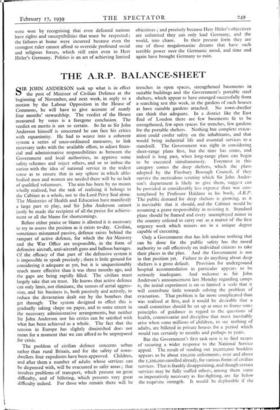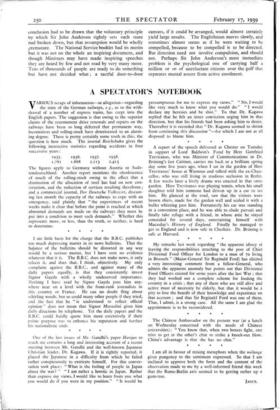THE A.R.P. BALANCE-SHEET
SIR JOHN ANDERSON took up what is in effect the post of Minister of Civilian Defence at the beginning of November, and next week, in reply to a motion by the Labour Opposition in the House of Commons, he will have to give account of nearly four months' stewardship. The verdict of the House measured by votes is a foregone conclusion. The verdict on merits is not so certain. So far as Sir John Anderson himself is concerned he can face his critics with equanimity. He had to weave into a coherent system a series of unco-ordinated measures, to link necessary tasks with the available effort, to adjust finan- cial and administrative responsibilities as between the Government and local authorities, to approve some safety schemes and reject others, and so to imbue the nation with the idea of national service in the widest sense as to ensure that in any sphere in which able- bodied men and women are needed there will be no lack of qualified volunteers. The aim has been by no means wholly realised, but the task of realising it belongs to the Cabinet as a whole, not to the Lord Privy Seal alone. The Ministries of Health and Education have manifestly a large part to play, and Sir John Anderson cannot justly be made the recipient of all the praise for achieve- ment or all the blame for shortcomings.
Before either praise or blame is allotted it is necessary to try to assess the position as it exists to-day. Civilian, sometimes misnamed passive, defence exists behind the rampart of active defence, for which the Air Ministry and the War Office are responsible, in the form of defensive aircraft, anti-aircraft guns and balloon barrages. Of the efficacy of that part of the defensive system it is impossible to speak precisely ; there is little ground for considering it adequate as yet, but it is unquestionably much more effective than it was three months ago, and the gaps are being rapidly filled. The civilian must largely take that on trust. He knows that active defence can only limit, not eliminate, the terrors of aerial aggres- sion, and his business is, both passively and actively, to reduce the devastation dealt out by the bombers that get through. The system designed to effect this is gradually taking shape on paper, and to some extent in the necessary administrative arrangements, but neither Sir John Anderson nor his critics can be satisfied with what has been achieved as a whole. The fact that the tension in Europe has slightly diminished does not mean for a moment that we can afford to be unprepared for crisis.
The problem of civilian defence concerns urban rather than rural Britain, and for the safety of town- dwellers four expedients have been approved. Children, and after them a number of adults whose services can be dispensed with, will be evacuated to safer areas ; that involves problems of transport, which present no great difficulty, and of billeting, which presents very great difficulty indeed. For those who remain there will be trenches in open spaces, strengthened basements in suitable buildings and the Government's portable steel shelters, which appear to have emerged successfully from a searching test this week, in the gardens of such houses as have suitable gardens attached. No town-dweller can think that adequate. In a district like the East End of London there are few basements fit to be strengthened, few open spaces for trenches, few gardens for the portable shelters. Nothing but complete evacu- ation could confer safety on the inhabitants, and that would bring industrial life and essential services to a standstill. The Government was right in considering short-range plans first, but the time has come, and indeed is long past, when long-range plans can begin to be executed simultaneously. Foremost in this category comes the deep shelters, which the plans adopted by the Finsbury Borough Council, if thcy survive the meticulous scrutiny which Sir John Ander- son's department is likely to give them, suggest can be provided at considerably less expense than was con- templated by Professor Haldane in his book, A.R.P. The public demand for deep shelters is growing, as it is inevitable that it should, and the Cabinet would be assuming a grave responsibility in resisting it. Standard plans should be framed and every unemployed miner in the country enlisted to carry out as a matter of the first urgency work which miners are in a unique degree capable of executing.
Only a Government that has left undone nothing that can be done for the public safety has the moral authority to call effectively on individual citizens to take their places in the plan. And the Government is not in that position yet. Failure to do anything about deep shelters is a gross default. Provision for underground hospital accommodation in particular appears to be seriously inadequate. And welcome as Sir John Anderson's announcement last Monday regarding camps is, the initial experiment is on so limited a scale that it will contribute little towards solving the problem of evacuation. That problem is far more complicated than was realised at first, and it would be desirable that a small committee should be set up at once to frame some principles of guidance in regard to the questions of health, commissariat and discipline that must inevitably arise when some millions of Children, to say nothing of adults, are billeted in private houses for a period which would run certainly to months and perhaps to years.
But the Government's first task now is to find means of securing a wider response to the National Service appeal. The result of sending out 20,000,000 booklets appears to be about ioo,000 enlistments, over and above the 1,200,000 enrolled already, for various forms of civilian services. That is frankly disappointing, and though certain services may be fully staffed others, among them some so imperatively necessary as fire-fighting, are far below the requisite strength. It would be deplorable if the conclusion had to be drawn that the voluntary principle by which Sir John Anderson rightly sets such store nad broken down, but that assumption would be wholly premature. The National Service booklet had its merits but it was not on the whole an inspiring document, and though Ministers may have made inspiring speeches they are heard by few and not read by very many more. Tens of thousands of people are ready to do something but have not decided what ; a tactful door-to-door canvass, if it could be arranged, would almost certainly yield large results. The Englishman moves slowly, and sometimes almost seems as if he were waiting to be compelled, because to be compelled is to be directed. But direction need not involve compulsion, and should not. Perhaps Sir John Anderson's most immediate problem is the psychological one of carrying half a million or so of unreluctant citizens over the gulf that separates mental assent from active enrolment.











































 Previous page
Previous page